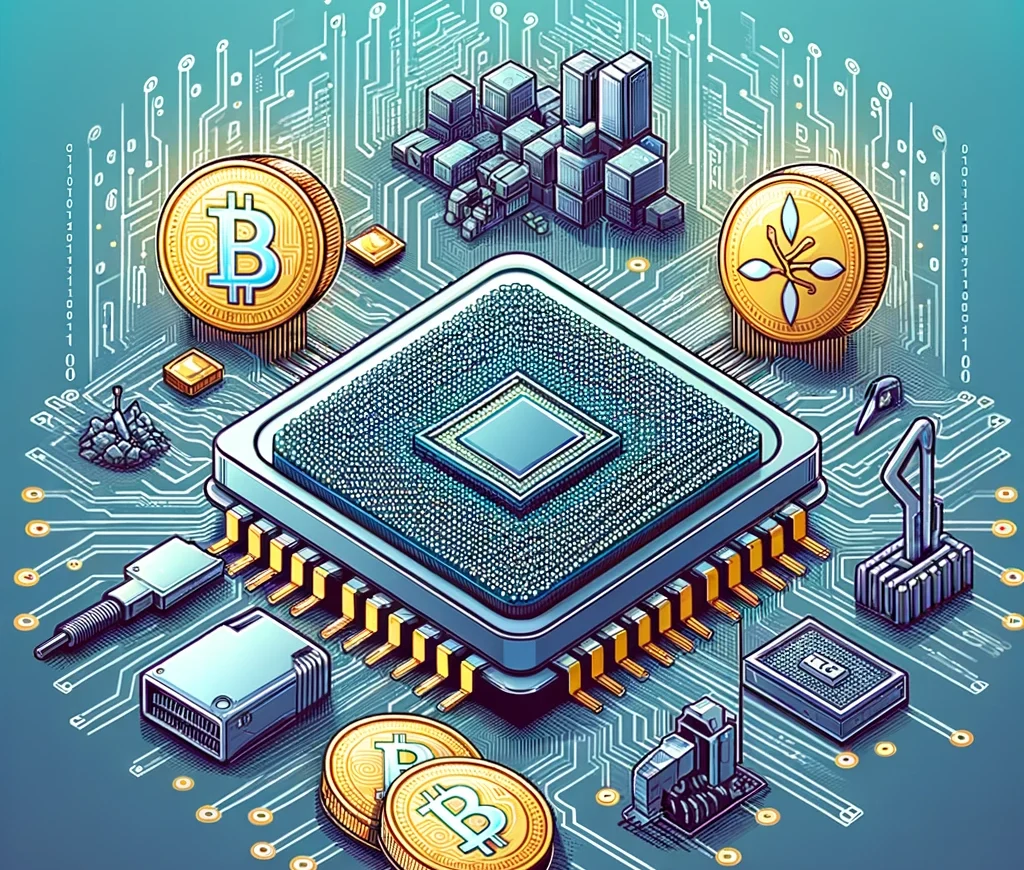Have you ever wondered how cryptocurrencies like Bitcoin are created? One method of creating new coins is through CPU mining, a process that involves using a computer’s central processing unit to perform complex mathematical calculations in order to validate and secure transactions on the blockchain. Here are answers to major questions you might have about CPU mining.
What is CPU Mining?
With CPU mining you use your regular computer for solving complex mathematical puzzles. Your CPU, the brain of your computer, takes on the task of processing transactions on a blockchain network. In return for this work, miners are rewarded with cryptocurrency. It sounds simple, but there’s a whole lot behind those calculations.
How CPU Mining Works
CPU mining is about solving cryptographic puzzles, essentially validating transactions on a blockchain, and adding new blocks. Each block added earns the miner a reward in cryptocurrency. This process demands computational power, and the CPU provides just that, albeit at a slower pace compared to GPUs and ASICs.
The Role of Algorithms in CPU Mining
Not all cryptocurrencies are designed the same way, especially when it comes to mining. Different coins use different algorithms, and some are more CPU-friendly. For instance, algorithms like CryptoNight, used by Monero, are designed to favor CPU mining because they’re less conducive to the parallel processing power of GPUs and ASICs.
Setting Up for CPU Mining
Getting started with CPU mining isn’t difficult. Here’s everything you need to start mining crypto with CPUs:
1. A decent computer: You don’t need a supercomputer, but a good processor is important.
2. Mining software: There’s plenty of software out there, such as NiceHash, tailored for CPU mining.
3. A cryptocurrency wallet: to store your hard-earned coins.
4. A mining pool: Going solo in mining can be like finding a needle in a haystack. Joining a pool means more consistent, albeit smaller, rewards.
Is CPU Mining Worth it?
We’d love to give you a number, but one thing you need to know about calculating the costs vs. rewards of CPU mining is that it depends on several factors. For example, the cryptocurrency you’re mining is a major determinant of the profitability of your crypto mining hustle.
To figure out if CPU mining is profitable, here are some major factors you need to consider:
- Electricity costs: Mining is power-hungry. If your electricity bill skyrockets, it could eat into your profits.
- The power of your CPU: More power usually means more coins, but also more electricity usage.
- The coin you’re mining: Some coins are more profitable than others, and this also changes over time due to the unpredictability of the cryptocurrency market.
- The mining pool’s fee: If you’re in a pool, they’ll take a cut.
- Realistic Expectations: Small Scale vs. Large Scale
Furthermore, on the question of whether or not CPU mining is profitable, let’s be real: you’re not going to become a millionaire overnight with CPU mining, especially if you’re just using your home computer. For small-scale miners, it’s more about participating in the blockchain ecosystem and earning a small passive income. Large-scale operations with multiple high-end CPUs can be profitable, but they require significant investment in hardware and energy.
Is CPU Mining still Efficient?
There was a time when CPU mining was the only way to mine cryptocurrencies, you could mine Bitcoin with a decent home computer and earn amazing rewards (in fact a lot of early Bitcoin miners made life-changing money through CPU mining). But as the network grew, the puzzles became harder, and CPUs became less efficient for mining cryptocurrencies than GPUs and ASICs which were adopted by crypto miners.
Related: Can You Mine Crypto on a Virtual PC?
CPU vs. GPU vs. ASIC Mining
As we said earlier, when it comes to cryptocurrency mining, CPUs aren’t the only tool. There’s GPUs (Graphics Processing Units) and ASICs (Application-Specific Integrated Circuits).
GPU mining uses graphics cards—think gaming but for crypto. They’re faster and more efficient than CPUs. Then you have ASICs, the heavyweights. These are custom-built for mining specific cryptocurrencies, making them incredibly fast but also expensive and inflexible.
But while a CPU isn’t as fast as a GPU and nowhere near an ASIC’s speed it’s more accessible. You don’t need fancy equipment; your home computer can be a miner.
Most CPU-Friendly Cryptocurrencies
Here are some CPU-friendly cryptocurrencies to look into if you want to invest in CPU mining:
1. Monero (XMR): Known for its privacy features, Monero remains one of the most popular choices for CPU miners. Its CryptoNight algorithm is designed to resist the dominance of ASICs and level the playing field for CPUs. This focus is on access.
2. VerusCoin (VRSC): VRSC uses VersusHash, a unique algorithm that is optimized for CPU mining.
3. Zcash (ZEC): While it can be mined with GPUs and ASICs, Zcash’s Equihash algorithm also allows for competitive CPU mining.
4. Haven Protocol (XHV): Based on Monero’s codebase, it offers similar benefits for CPU miners.
Optimizing Your CPU Mining Setup
Here is a checklist to consider before you set up for CPU mining:
1. Choosing the Right Hardware
- Processor Matters: A modern, multi-core processor with high thread counts is ideal.
- Adequate Cooling: Mining can heat up your CPU, so efficient cooling is essential to prevent overheating.
- Memory and Storage: Enough RAM and a stable hard drive or SSD complete your setup.
2. Software and Mining Pools
- Mining Software: Choose software that’s compatible with your hardware and the coin you’re mining.
- Selecting a Mining Pool: Look for pools with lower fees, a good reputation, and support for the coin you’re interested in.
3. Fine-tuning for Efficiency
- Overclocking: Boosting your CPU’s speed can increase mining performance, but beware of overheating risks.
- Power Consumption: Balance performance with energy use. Sometimes, lower power consumption can be more profitable in the long run.
Key Takeaways
1. CPUs for Crypto Mining: While not as powerful as GPU or ASIC mining, CPU mining is accessible and still relevant for certain cryptocurrencies.
2. Choice of Cryptocurrency: Coins like Monero, VerusCoin, and Zcash offer more potential for CPU miners. But it’s still important to stay updated on market trends and coin profitability.
3. Choosing the right hardware and software is important: Investing in a good CPU, efficient cooling, and choosing suitable mining software can optimize your mining setup.
4. Manage your expectations: CPU mining won’t make you rich overnight, especially for small-scale miners. It’s more about contributing to the blockchain and earning a modest passive income.
5. Profitability Is Influenced by Several Factors: Electricity costs, hardware efficiency, mining pools, and the chosen cryptocurrency all play a role in determining profitability.
Frequently Asked Questions
1. Can CPU Mining Damage My Computer?
Intensive computing tasks can shorten hardware lifespan so continuous CPU mining, especially on consumer-grade hardware, can lead to increased wear and tear due to sustained high temperatures and usage. Adequate cooling and monitoring can reduce these risks.
2. How Long Does It Take to Mine One Coin Using a CPU?
The time required to mine a single coin using a CPU depends on several factors, including the specific cryptocurrency, the difficulty level of its network, the power of the CPU, and whether you’re mining solo or in a pool.
3. Can I Mine Any Cryptocurrency with a CPU?
While technically possible to mine most cryptocurrencies with a CPU, it’s not feasible for all due to high difficulty levels and the dominance of more powerful GPU and ASIC miners. Some cryptocurrencies, however, are designed to be ASIC-resistant and are more suitable for CPU mining.
4. How Do I Calculate the Profitability of CPU Mining?
To calculate CPU mining profitability, consider factors like your CPU’s hash rate, the power consumption, electricity cost in your area, the current value of the cryptocurrency you’re mining, and any pool fees if you’re mining in a pool. Online mining calculators can also help simplify this process by providing estimates based on these inputs.
5. Can CPU Mining Be Automated?
CPU mining can be somewhat automated using mining software that manages the mining process. However, monitoring and adjustments may be required to optimize performance and profitability, especially in response to changes in cryptocurrency values and mining difficulties.
6. Is CPU Mining Eco-Friendly?
No, because CPU mining, like all forms of cryptocurrency mining, can have a bad environmental impact due to its electricity consumption. But sometimes CPU mining can be eco-friendly if green energy is the source of the electricity being used to mine.
7. Can I Use a Laptop for CPU Mining?
While it’s possible to use a laptop for CPU mining, it’s generally not recommended due to overheating risks, lower performance compared to desktop CPUs, and the potential for accelerated hardware degradation.










